|
|
|
Sort Order |
|
|
|
Items / Page
|
|
|
|
|
|
|
| Srl | Item |
| 1 |
ID:
103650
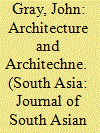

|
|
|
|
|
| Publication |
2011.
|
| Summary/Abstract |
In this paper I identify the doubleness of domestic space-not just as architecture, that is, the production of houses that expresses social reality, cultural meanings and/or cosmology, but also as architechnemacr, that is, as the embodied experience, tacit knowledge and revelation produced by everyday living in domestic space. This distinction provides the framework for analysing Nepali houses as domestic mandalas. I argue that in the taken-for-granted, everyday use of domestic space as architechnemacr, Nepalis engage in an embodied bringing forth of their houses as an enframing whole, as a structure of revealing of the cosmos and the nature of their lifeworld as Householders.
|
|
|
|
|
|
|
|
|
|
|
|
|
|
|
|
| 2 |
ID:
192975
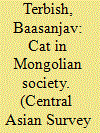

|
|
|
|
|
| Summary/Abstract |
In Mongolia the cat is viewed ambiguously. It is seen either as a good, a bad or an ugly creature, or as a mix of all these. This ambiguity stems from the cat’s function as a mirror of Mongolian society, where the transition to socialism and post-socialism was traumatic, interrupting the cosmological order. This paper explains these diverse images by analysing old legends and modern folk stories about felines.
|
|
|
|
|
|
|
|
|
|
|
|
|
|
|
|
| 3 |
ID:
042050
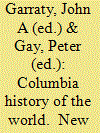

|
|
|
|
|
| Publication |
New York, Harper and Row, Publishers, 1972.
|
| Description |
xx, 1237p.Hbk
|
| Standard Number |
0880290048
|
|
|
|
|
|
|
|
|
|
|
|
Copies: C:1/I:0,R:0,Q:0
Circulation
| Accession# | Call# | Current Location | Status | Policy | Location |
| 027122 | 909/GAR 027122 | Main | On Shelf | General | |
|
|
|
|
| 4 |
ID:
141395
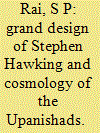

|
|
|
|
|
| Summary/Abstract |
Stephen Hawking was born in 1942 on the anniversary of Galileo’s death. He holds Sir Isaac Newton’s chair as Lucasian Professor of Mathematics at Cambridge University and is widely regarded as one of the most brilliant theoretical physicists since Einstein
|
|
|
|
|
|
|
|
|
|
|
|
|
|
|
|
| 5 |
ID:
148857
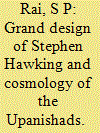

|
|
|
|
|
| Summary/Abstract |
Chapters I and II appeared in the previous Volume (17:1) of Dialogue.
Chapter I discussed the philosophy of Cosmology and various related
questions raised in the introductory para of Stephen Hawking's book
Grand Design. Chapter II briefly summarised Stephen Hawking's
concept of cosmology in the Grand Design.
|
|
|
|
|
|
|
|
|
|
|
|
|
|
|
|
| 6 |
ID:
192309
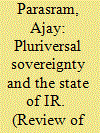

|
|
|
|
|
| Summary/Abstract |
IR proceeds on a Eurocentric ontological assumption that sovereignty has universal validity today. How can IR be decolonised, when in spite of countless examples of the enactment of ‘sovereignty otherwise’, the discipline remains unconcerned with the fact that the logic of sovereignty remains uni-versal. The question is as much political as it is intellectual, because as a discipline, we have allowed the inertia of our professional rhythms to marginalise pluri-versal sovereignty, or the organisation of sovereignty along different ontological starting points. I argue IR must abandon its disciplinary love affair with uni-versal sovereignty. The tendency to ‘bring in’ new perspectives by inserting them into an already ontologically constituted set of assumptions works to protect IR’s Eurocentricity, which makes disciplinary decolonisation untenable. I propose that as a starting point, IR needs to be more mature about recognising the decolonisations that are happening under our very feet if we are to stand a chance at disciplinary level decolonisation. As an illustrative example, I explore an ongoing collision of settler-colonial and Mi’kmaw sovereignty through the issue of lobster fisheries in Mi’kma’ki, or Nova Scotia as the territory is known to Canadians.
|
|
|
|
|
|
|
|
|
|
|
|
|
|
|
|
| 7 |
ID:
187532


|
|
|
|
|
| Summary/Abstract |
This article will attempt to ‘provincialise’ (Chakrabarty, 2000) the ‘secular cosmology’ of International Relations (IR) through an examination of the relational cosmology of dharma. We argue that IR is grounded in ‘secularised’ Judaeo-Christian assumptions concerning time, relations between self and other, order, and the sovereign state that set the epistemic limits of the discipline. These assumptions will be ‘provincialised’ through an engagement with dharma based on a reading of The Mahābharāta, one of the oldest recorded texts in the world. We argue that the concept of dharma offers a mode of understanding the multidimensionality of human existence without negating any of its varied, contradictory expressions. By deconstructing notions of self and other, dharma illustrates how all beings are related to one another in a moral, social, and cosmic order premised on human agency, which flows from ‘inside-out’ rather than ‘outside-in’ and that is governed by a heterogenous understanding of time. This order places limits on the state's exercise of power in a given territory by making the state responsible for creating social conditions that would enable all beings to realise their potential, thus qualifying the principle of state sovereignty that remains the foundation of the ‘secular cosmology of IR’.
|
|
|
|
|
|
|
|
|
|
|
|
|
|
|
|
| 8 |
ID:
042980


|
|
|
|
|
| Publication |
New York, Charle's Scribner's Sons, 1970.
|
| Description |
xviii, 373p.
|
|
|
|
|
|
|
|
|
|
|
|
Copies: C:1/I:0,R:0,Q:0
Circulation
| Accession# | Call# | Current Location | Status | Policy | Location |
| 006177 | 505.05/SCI 006177 | Main | On Shelf | General | |
|
|
|
|
| 9 |
ID:
178774
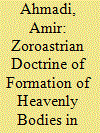

|
|
|
|
|
| Summary/Abstract |
This article is about the doctrine of the formation of celestial bodies in Pahlavi texts. The doctrine is peculiar. It clashes not only with the accounts of the Gāϑā and the Younger Avesta but also with the general cosmology of Pahlavi literature. Nonetheless it must be authoritative since it is found in our main sources of Zoroastrian (Pahlavi) cosmogony and there does not seem to be an alternative account of the formation of celestial bodies. It thus prompts us to look for its background. This article presents and discusses the texts that contain the Pahlavi doctrine, examines its Avestan roots, and shows the influence of Presocratic cosmogonic speculations on the doctrine. Further, comparative material allows us to propose a conceptual genealogy of the basic constituents of the doctrine.
|
|
|
|
|
|
|
|
|
|
|
|
|
|
|
|
|
|
|
|
|